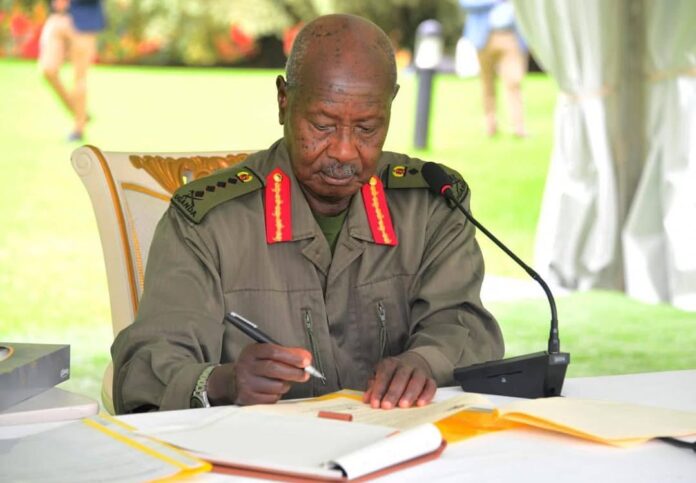On Wednesday, March 19, 2025, President Yoweri Kaguta Museveni met with journalists from Bunyoro sub-region at State Lodge – Masindi, during his ongoing three-day countrywide performance assessment tour focused on the Parish Development Model (PDM). The meeting covered a range of issues, including healthcare, economic development, land evictions, and governance, as part of his government’s commitment to addressing key challenges in the region.
President Museveni began the discussion by emphasizing the government’s commitment to primary healthcare and disease prevention. In a bold statement, the President declared, “Have you ever heard that I have been admitted to the hospital in my 38 years as President? Hospitals are like garages for damaged vehicles.” His remarks underscored his belief in the power of prevention over treatment, a philosophy that has shaped the National Resistance Movement (NRM) government’s approach to health. He noted that 80% of illnesses are preventable through public health measures, including immunization, proper hygiene, nutrition, and malaria control.
The President attributed his own health to disciplined lifestyle choices made during his time in the bush during Uganda’s struggle for independence. “When we were in the bush for five years, we did not fall sick because we drank boiled water and slept under mosquito nets,” he recalled. This preventative mindset is central to Uganda’s ongoing efforts to improve public health through initiatives like immunization and access to clean water.
In his remarks on economic transformation, President Museveni reiterated the significance of the Parish Development Model (PDM) as a tool for driving inclusive growth. The government has been allocating Sh100 million annually to parish SACCOs (Savings and Credit Cooperative Organizations) with specific quotas aimed at empowering women, youth, persons with disabilities, the elderly, and men. The President emphasized, however, that the core of economic transformation lies not only in gender or social categories but in the economic involvement of entire families.
Drawing from personal experience, Museveni shared a story of how his family was transformed from traditional cattle-keeping to more diversified wealth creation following his education. He called for every household to be engaged in wealth creation as a way of ensuring sustainable national development.
A significant portion of the conversation was dedicated to addressing the controversial issue of land evictions. President Museveni strongly condemned unlawful evictions, stressing that tenants have legal rights to remain on the land even if it is sold. “There is no legal basis for evictions. Even if a landlord sells land, tenants have a right to stay. The government will defend our people from illegal evictions,” he stated. His remarks were aimed at reinforcing the government’s position of protecting citizens against unlawful displacement.
President Museveni also took the opportunity to address the growing issue of cattle theft in rural areas. He instructed law enforcement officers to take a tougher stance on cattle thieves, stating that there should be no police bond for such criminals. Additionally, he indicated ongoing discussions with the Chief Justice to ensure that cattle thieves are denied court bail.
The President also dismissed the notion that cultural institutions, such as kingdoms, hinder wealth creation. He pointed to the example of Ankole, a region with no kingdom but a thriving economy, arguing that poverty is rooted in households, not the absence or presence of kingdoms.
Museveni also touched on the issue of swine flu, pledging to consult veterinary experts to address the disease affecting pigs in the country. He assured the public that the government would not blame the poor for the deaths of their pigs if the disease is not under control.
On the topic of government spending, the President criticized the creation of new administrative units such as cities and districts, which he argued lead to unnecessary administrative costs. He advocated for a focus on increasing the allocation to PDM rather than creating more administrative divisions, which, he said, interferes with development programs.
The meeting, which also included Prime Minister Rt. Hon. Robinah Nabbanja, Minister of ICT Dr. Chris Baryomunsi, and other government officials, marked another step in the President’s continued engagement with Ugandans as he works toward realizing the vision of an economically prosperous and self-reliant Uganda.
























